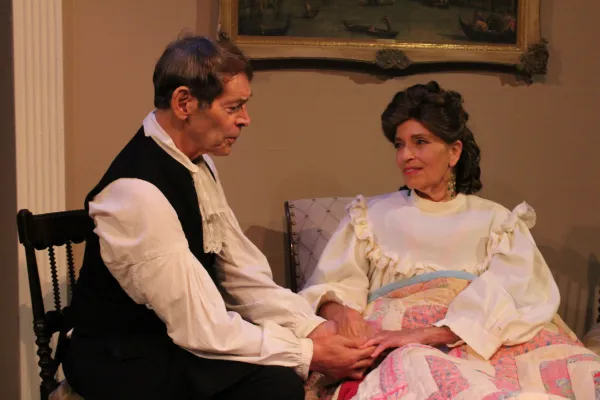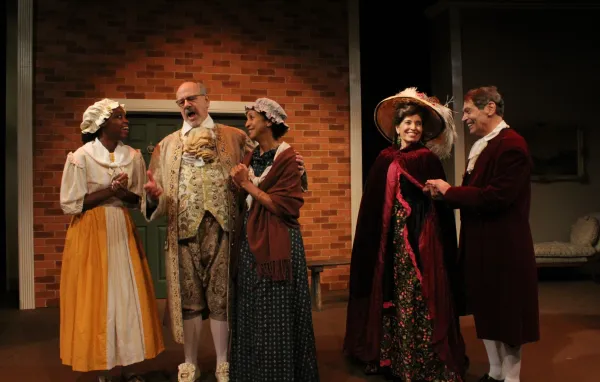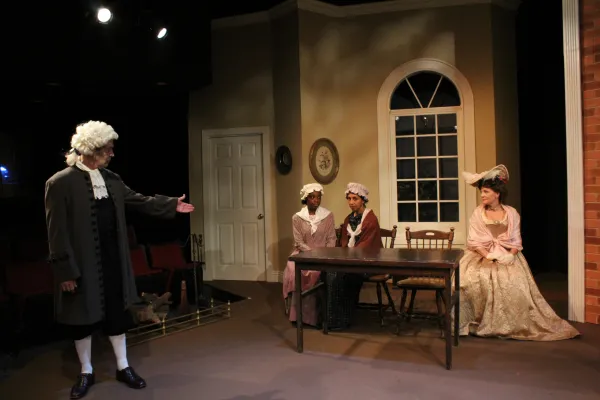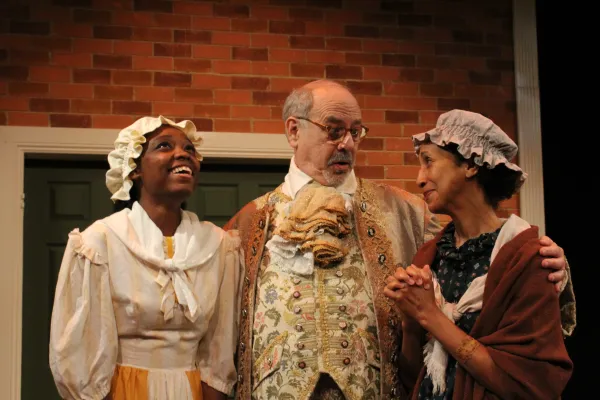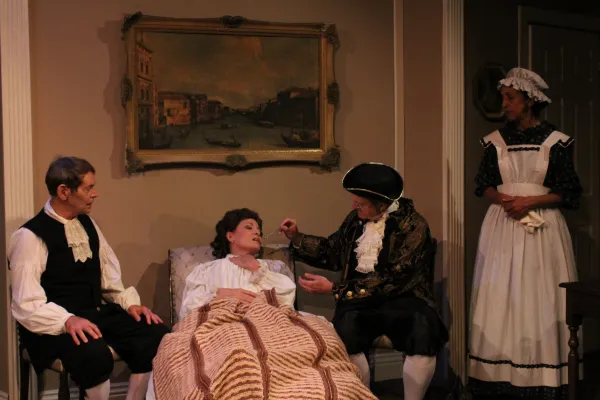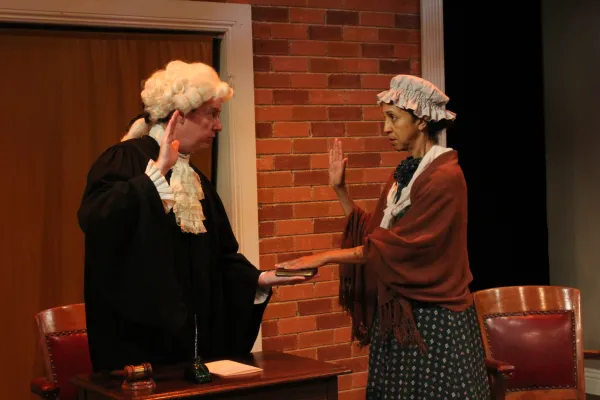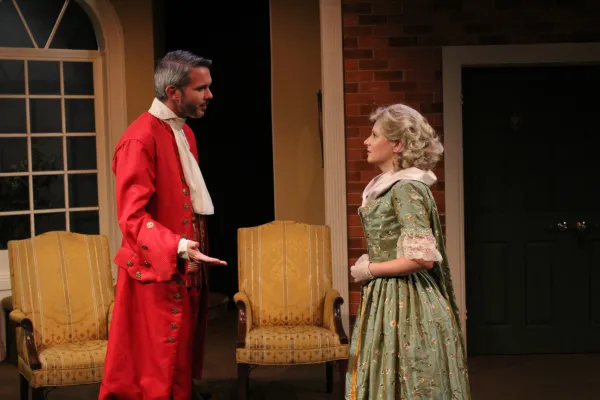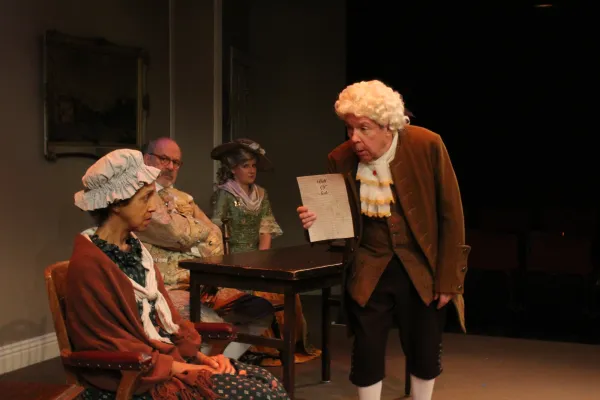Thank God Almighty, I’m Freeman at Last: A Colonial Atticus Finch and Sir Wilfrid Robarts Clash in Judgment at Sheffield
In what passes for “political discourse” in our benighted country, some contend there were “benefits” to slavery, from the antebellum South’s plantations to Nazi concentration camps. How to convince these apologists for slavery – from the crafty crafters of Florida’s school curriculum and its “woke” addled governor, to Fox “News’” smug smarmy smirking chimp Greg Gutless – otherwise? Here are two suggestions:
The first is to subject them to forms of modern-day slavery, which BTW didn’t end with Lincoln’s 1863 Emancipation Proclamation. According to https://www.voices4freedom.org/: “At this present moment, there are more people suffering under slavery than at any other time in history. The Global Slavery Index (GSI) estimates that more than 50 million people are currently trapped in modern day slavery.”
Examples of 21st century slavery that those who believe bondage had beneficial aspects can be coerced into include: Human trafficking or forced labor aboard a fishing trawler somewhere in the Pacific Ocean or at a work camp. (See: https://www.antislavery.org/.) Then, after a year of their dehumanizing experience of enslavement, let’s ask them: “So, how exactly have you benefited from the deprivation of your liberty for no wages? And would you like to undergo another year of involuntary servitude?”
Of course, there were benefits to slavery – that is, for the slave owners, not for those who did their dirty work in the cotton fields or factories, oppressors who enriched themselves at the expense of the unpaid labor performed at the threat of the lash by their enchained chattel. Prior to the Civil War, Dixie’s plantation overlords were among the wealthiest Americans. But there is a less drastic way to persuade slavery’s contemporary defenders that enslavement did not benefit those in bondage: Dispatch them to see Marion Zola’s new play One Moment of Freedom.
This gripping world premiere dramatizes a real life if largely lost incident that, like Steven Spielberg’s 1997 slave revolt/courtroom drama Amistad, alas, I’d somehow never heard of. But if history class curriculum and book writers have mostly missed this sizzling saga, dramatist Marion Zola has somehow plucked it from obscurity, rescuing and ferreting Bet (Catherine Bruhier) and Lizzie (Kristal Dickerson) out of the forgotten yet essential annals of American history.
In 1781, the Black mother and daughter were the enslaved domestic workers in the Sheffield, Massachusetts home of Col. John Ashley (John Combs). (While slavery may have been more widespread in the South, it still existed in New England at the time.) After his daughter Alison (L.A. transplant Katyana Rocker-Cook, an Oxford grad who performed at London’s West End) executes an act of cruelty, Bet flees to the home of attorney Theodore Sedgwick (Michael Robb).
Although illiterate and uneducated, the household toiler has overheard the highfalutin rhetoric of Robb and his close friend Ashley plus other patriots discussing the anti-monarchy Sheffield Declaration, a petition for individual rights against British policies, in Ashley’s home, as Bet served them. Presaging Thomas Jefferson’s 1776 Declaration of Independence, this Massachusetts manifesto that’s also known as the Sheffield Resolves, proclaims: “Mankind in a state of nature are equal, free, and independent of each other, and have a right to the undisturbed enjoyment of their lives, their liberty and property.”
Bet also “eavesdrops” when the revolutionaries are discussing Massachusetts’ emerging Constitution. Somehow, this humble enslaved 36-year-old Black woman, whose African-American husband has died fighting as a soldier during the Revolutionary War, gets it into her head that these rights also pertain to her. Bet reportedly asked: “I’m not a dumb critter; won’t the law give me my freedom?” All hell breaks loose!
(After the play, Ms. Zola informed me that the Massachusetts Constitution is not only the world’s oldest written constitution and was America’s first former colony/state to have a constitution, which John Adams helped draft and which, with his influence, went on to shape the U.S. Constitution.)
Bet lobbies Sedgwick, a Continental Congress delegate and, as mentioned, a lawyer, to represent her in court, in an effort to gain her freedom from Bet’s “owner,” Col. Ahsley, who is his friend. Finally, at the cost of their friendship, the conflicted Sedgwick rises to the historical occasion and takes Bet’s case, one of America’s early so-called “freedom suits,” setting the stage (literally) for the clash of two courthouse gladiators. During a brief intermission, the stage’s domestic set is rearranged to become a courtroom, and as the proverbial curtain lifts on Act II, the legal battle of the titans, that is the dramatic highlight of this play, commences.
On the one hand there is Sedgwick, who skillfully, articulately argues that slavery is antithetical to the notions of liberty enshrined in not only the Massachusetts Constitution and Sheffield Declaration, but in the heart of the Declaration of Independence itself. Enslavement, Sedgwick insists before the County Court of Common Pleas in Great Barrington, goes against the grain of the very ideals that the American Revolution is being fought over.
In doing so, Robb incarnates nothing less than a colonial Atticus Finch, who in a pinch defended a wrongfully accused Black man in Harper Lee’s immortal To Kill a Mockingbird, for which Gregory Peck picked up a Best Acting Oscar in 1963. Robb’s Sedgwick epitomizes the description by Frenchman Alexis de Tocqueville, that astute observer of early America, that attorneys are “the most intellectual section” of the U.S., “the most powerful barrier” against “the unreflective passions of democracy.”
But hold on – has Sedgwick met his match when he comes up against defense attorney David Noble? With Charles Laughton-like panache, the ignoble Noble launches a legalistic counterattack defending the sacrosanct notion of “property.” The scenery chewing (and I mean this in the best sense) Noble is riveting, cross examining witnesses, sparring with opposing counsel, delivering his summation to the jury and so on. You can’t take your eyes off of this veteran stage and screen actor, who trained with London’s Royal Academy of Dramatic Art, appeared in movies such as Forrest Gump, in soap operas and numerous TV series, including The Waltons and The Nanny. His Moment performance brilliantly channels Laughton’s Sir Wilfrid Robarts in Billy Wilder’s 1957 Witness for the Prosecution, with a dollop of Laughton’s Captain Bligh in 1935’s Mutiny on the Bounty, to pack a wallop. (See: https://www.imdb.com/title/tt0051201/?ref_=nv_sr_srsg_0_tt_8_nm_0_q_Witness%2520for.)
His honor (Michael Kerr, who alternates in the roles of the judge, doctor and well-dressed man with David Westbay) seemed to me to be presupposed in favor of the defense. Courtroom stories are inherently dramatic because of the adversarial nature of the legal system, which innately drips with conflict. Moment is worth seeing just for this trial by combat alone – especially as such profound legal and philosophical principles are at stake – although there is much more to this two-hour or so play. A structural problem that Zola’s two-acter has is that while the battle of the bickering barristers before the bench is the apex of Moment’s dramatic arc, there’s about another 20-minutes of onstage action afterwards, a sort of anticlimactic third act (although technically there are only two acts per se, divided by one intermission).
Another problem is that Moment looks at enslavement solely from the economic point of view. Noble ignobly (sorry, I tried, but I just can’t resist a good pun) tries to justify slavery on the basis of Bet and Lizzie being the property of Col. Ashley. Race, racism and the notion of white supremacy – that Caucasians are genetically superior to people of African origin and are therefore justified in their domination and exploitation of the “inferior” Blacks – are never mentioned in this drama.
An additional dilemma for 21st century theatergoers is that Moment may suffer from “white savior syndrome,” wherein Blacks have little if any agency and a noble-minded Caucasian who champions their cause is the story’s protagonist. As with the above reference regarding whether the defense’s pro-slavery argument was racially-tinged, your humble scribe simply doesn’t know enough about the situation in 1781 Massachusetts – when the vastly outnumbered Blacks were reportedly only a mere 1.8% of the population (https://userpages.umbc.edu/~bouton/History407/SlaveStats.htm) – to assess the accuracy and authenticity of these plot points.
Be that as it may, while her Bet is no fire-breathing rabblerouser in the Melina Abdullah mode, Bruhier portrays her character in a subtle, subdued manner with a steely determination, who renames herself “Elizabeth Freeman.” Bet reminds us that while “lowly born” humble humans may not be as exalted in the social pecking order as, say, Col. Ashley, the freedom and well-being of the wretched of the Earth is as important to them as it is to the Grand Poobahs of the world.
Speaking of Col. John Ashley, John Combs is to be commended for stepping into the role at the last minute due to an emergency, delivering an estimable, worthy performance as the slaveholder on the horns of an ethical dilemma. With his stunning period apparel, costume designer Michael Mullen vividly helps bring the colonial/Revolutionary War era alive and is nothing less than a co-star in this production who should be remembered at awards time. The period authenticity is likewise enhanced by hair/wig/makeup designer Judi Lewin, especially as those bewigged courtroom gladiators have at it in the legal arena. Linda Alznauer adroitly directs this production, with music ranging from period to classical to John Legend selected by sound designer Nick Foran.
One Moment of Freedom doesn’t make it clear that the Sheffield Declaration/Resolves was penned eight years before most of the play’s action took place, nor the fact that the Revolutionary War was still being fought in 1781. But these and some other minor historical inconsistencies with the record are mere quibbles of chronicling that are sometimes sacrificed onstage in the name of dramatic license. Much to the credit of Marion Zola and the cast and crew, One Moment of Freedom – which takes its title from a moving statement by Bet – is a dramatic rejoinder to those currently seeking to dismiss or ignore American history, especially as it pertains to Blacks. Moment deserves – and demands – to be seen and celebrated by ticket buyers who relish well-acted rip-roaring yarns, the significance of truth in history and that the “all” in “all people are created equal” is not accompanied by an asterisk, singling out exceptions. All means all, and all in all this educational show is highly entertaining and well worth seeing.
One Moment of Freedom is being presented through August 27 at Theatre Forty, 241 S. Moreno Drive, in the Mary Levin Cutler Theatre (same venue, new name), Beverly Hills, CA 90212. The venue is on the campus of Beverly Hills High School. Free parking is available in the garage. Moment is being performed: Thursdays at 7:30 p.m. - August 3, 10, 24; Fridays at 7:30 p.m. - July 28, August 11, 25; Saturdays at 7:30 p.m. - July 29, August 12, 26; Sundays at 2:00 p.m. - July 30, August 13, 27; Tuesday at 7:30 p.m.- August 15; Wednesdays at 7:30 p.m. - August 2, 9, 16. Ticket info: (310)364-3606; http://theatre40.org.



